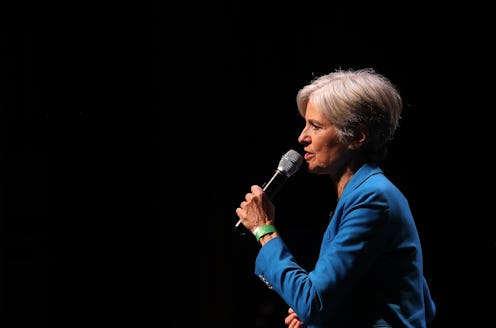News
How Many Electoral Votes Did Jill Stein Get?
The Green party's Jill Stein completed her second bid for president on Tuesday. In 2012, Stein earned 0.4 percent of the popular vote. But in 2016, an election year featuring two historically unpopular major party candidates, Stein had hoped to garner the massive supporter base of Vermont Sen. Bernie Sanders and outperform the third-party norm. So, how many electoral votes did Stein get?
Unlike fellow third-party candidate, Gary Johnson of the Libertarian ticket, Stein hardly flirted with five percent in the polls throughout the general election. Compared to her performance in 2012, the one percent of the vote she got on Election Day in 2016 was notably better. Stein pulled in 1,193,964 popular votes as of Wednesday morning, with 97 percent of areas reporting.
As usually happens with third-party candidates, Stein did not earn a single of the 538 electoral votes available. Even if she had performed significantly better, she likely would not have picked one up this year. And that's partly because 48 states assign all their electoral votes to the candidate who wins a plurality of the vote in the state. Accomplishing such in a single state is a tall order for a third-party candidate, and one that has occurred on rare occasion since the Republican and Democratic parties became the country's major parties.
The best performance from a third-party candidate in recent history was from independent Ross Perot, who got nearly 19 percent of the popular vote in 1992. Still, he got a big fat zero from the Electoral College because he didn't win a single state.
The last non-major-partier to get any electoral votes was the American Independent Party's George Wallace, who won 46 in 1968. 20 years before, Strom Thurmond, running on the States' Rights Democratic ticket, won 39 electoral votes. Progressive Robert La Follette eked out 13 in 1924. Lastly, former Republican President Theodore Roosevelt earned 88 electoral votes in 1912 under the Progressive ticket.
Stein no doubt hoped to be the fifth non-major-party candidate since the development of the two-party system to earn electoral votes in 2016. She pitched hard to Sanders supporters and to those with student loan debt, making the cancellation of such debt a key tenet of her campaign. But she was ultimately unable to capitalize on the widespread dissatisfaction with Hillary Clinton and Donald Trump exhibited by the American electorate.
However, even though Johnson polled noticeably better than Stein throughout the election season, he, too, failed to pick up a single vote in the Electoral College. Unless third parties substantially strengthen in between elections or the electoral process is fundamentally reformed, it will be a struggle for their candidates to realistically create any path toward the White House.
